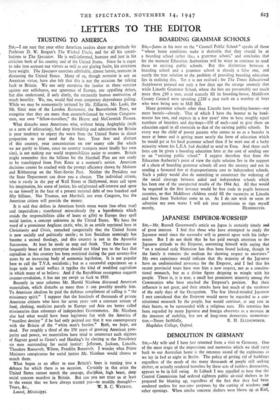LETTERS TO THE EDITOR
TRUSTING TO AMERICA
Sitt,—I am sure that your other American readers share my gratitude for Professor D. W. Brogan's The Wicked Uncle, and for all his contri- butions to The Spectator. He is well-informed, humane and just in his criticism both of his country and of the United States. Since he is eager to take into account our virtues as well as our glaring faults, his strictures have weight. The Spectator exercises admirable, almost heroic, restraint in discussing the United States. Many of us, though restraint is not an American virtue, have also felt that this is not the occasion for talking back to Britain. We not only recognise the justice in these outcries against our selfishness, our ignorance of Europe, our appalling delays, but also understand, if only dimly, the eminently human motivation of much hostility. We, too, would find even temporary dependence galling. While we may be momentarily irritated by Mr. Zilliacus, Mr. Laski, the Mt. Sinai tone of the London Economist, the Beaverbrook Press, we recognise that they are more than counterbalanced by various Congress- men, our own " fellow-travellers," the Hearst and McCormick Presses.
What disturbs most Americans who, without being Anglophile (with us a term of infatuation), feel deep friendship and admiration for Britain is your tendency to expect the worst from the United States in direct proportion to your need for the best. Your fear and distrust of this country, your concentration on ode seamy side (for which we are partly to blame, since no country trumpets more loudly her own sins), is not making our world responsibilities easier to assume. Britain might remember that the billions for the Marshall Plan are not ready to be transhipped from Fort Knox at a moment's notice. American decisions cannot be reached with the prompt efficiency shown by Molotov and Ribbentrop on the Nazi-Soviet Pact. Neither the President nor the State Department can draw you a cheque. The individual citizen, who is rarely in the pay of Wall Street or Hollywood, must call upon his imagination, his sense of justice, his enlightened self-interest and agree to tax himself in the face of a present national debt of two hundred and fifty billions. Not Truman, not Marshall, not even Congress, but the American citizen will provide the money.
It is said that dollars in American hands mean waste (too often true) and imperialism ; transferred miraculously (by a legerdemain which avoids the responsibilities alike of loans or gifts) to Europe they spell social justice, a concept unknown in the United States. We have the word of a prominent Anglican cleric, who, in an article reprinted here in Christianity and Crisis, remarked categorically that the United States is now socially and politically sterile ; to him Socialism seemingly has become a second theology, and this country is not in the Apostolic Succession. At least he made us stop and think. That Americans so frequently boast of free enterprise should not blind you to the fact that capitalism in this country has been restricted during the past seventy-five years by an increasing body of economic legislation. It is not popular here to call the T.V.A. socialistic ; but as a successful experiment on a large scale in social welfare it typifies the kind of modified capitalism in which many of us believe. And if the Republican resurgence suggests Counter-revolution, it has not yet swept us back to 1910.
Recently in your columns Mr. Harold Nicolson discussed American materialism, which disturbs us more than it can possibly trouble him. To American idealism he paid the dubious compliment of calling it " the missionary spirit." I suppose that the hundreds of thousands of private American citizens who have for seven years sent a constant stream of food, clothing, medicine parcels to Europe and Asia are better called missionaries than saboteurs of independent Governments. Mr. Nicolson also had what would have been legitimate fun with the America of " manifest destiny " if he had only pointed out that it was contemporary with the Britain of the " white man's burden." Both, we hope, are dead. For roughly a third of the 150 years of growing American pros- perity and power, we materialists have tried to counteract such regimes of flagrant greed as Grant's and Harding's by electing to the Presidency six men outstanding for social justice': Jefferson, Jackson, Lincoln, Theodore Roosevelt, Wilson, Franklin Roosevelt. I wonder what Prime Ministers conspicuous for social justice Mr. Nicolson would choose to match them.
What began as an effort to ease Britain's fears is turning into a defence for which there is no occasion. Certainly in this crisis the United States cannot match the courage, discipline, high heart, deep social concern manifest in Britain. But can you not trust us at least to the extent that we have always trusted you—to muddle through?—






























 Previous page
Previous page